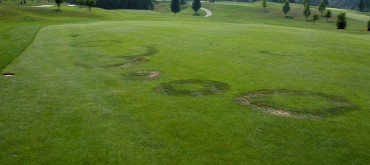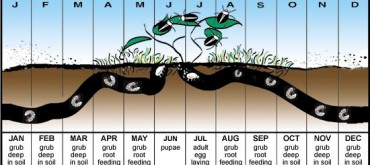As we make our way into June and our lawns begin to take on more stress surrounding the weather’s temperature, there is a particular insect that is important to keep an eye out for. Chinch bugs thrive in warm dry conditions, and prefer environments that lack moisture or poor fertilization. They are quite small, vary in their color depending on their maturity, and are most prominent come July.
Chinch bug damage comes from the insects’ consumption of the sap within the crown of the grass plant, and overtime can cause the lawn to turn brown. As fall then approaches they retreat back towards edges of homes or garden beds, where they reside overwinter as adults. It is this annual migration to and from the lawn that is a usual tell tale that they might be in your lawn, especially if this drought like appearance is spreading from one of their overwinter sites like a garden.
The best defense against chinch bugs is a regularly fertilized lawn with proper watering, and proper mowing. Watering once to twice a week providing roughly 1 inch of water each time, and mowing no shorter than 3 inches will aid in creating a favourable environment for your bluegrass lawn and not for chinch bugs. A helpful tip if you are experiencing chinch bug damage is to apply a soapy water solution onto the lawn in those areas when they are most active (June/July) followed shortly after with a good watering to rinse any remaining soap off the grass plant. Like many small plant feeding insects, soap is an ideal solution to discourage feeding, and reduce insect populations. As of last year, there was no legally registered product for the control of these insects. However, this past winter the government has released a product that offers some hope that we might have something for next year. As a company we will be performing our own additional research to see if this is something that shows a high enough efficacy to warrant offering it as a possible solution to our customers for later this year or next depending on our findings.
If you are interested in learning more about how to maintain your lawn to help prevent stressors that can negatively affect it, you can visit our website below or contact our office.





